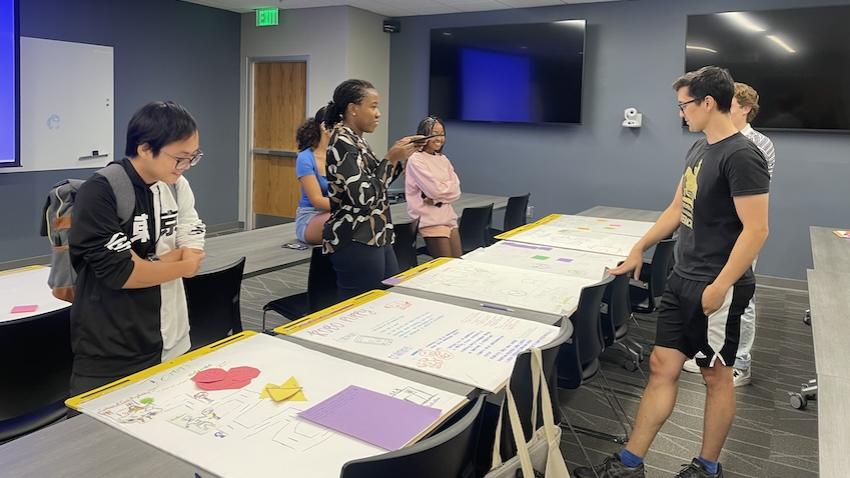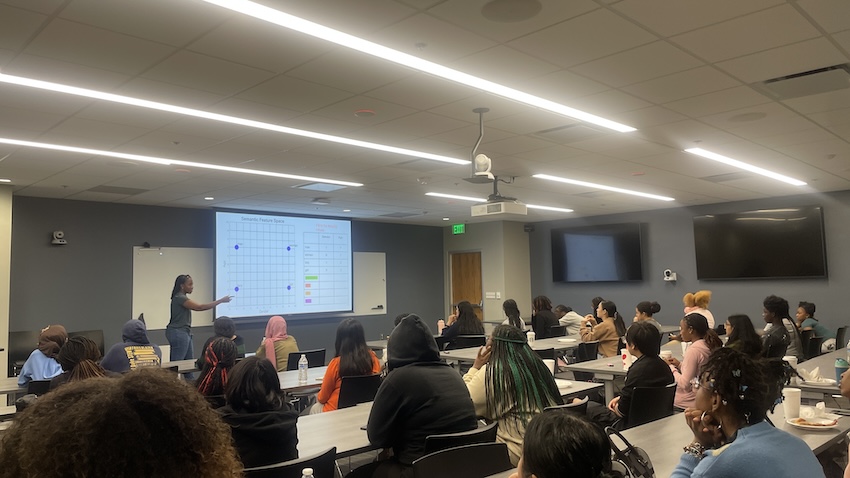
AI4GA Lays Groundwork for NSF-funded Nationwide K-12 AI Curriculum
Working on a multi-institutional team of investigators, Georgia Tech researchers have helped the state of Georgia become the epicenter for developing K-12 AI educational curriculum nationwide.
The new curriculum introduced by Artificial Intelligence for Georgia (AI4GA) has taught middle school students to use and understand AI. It’s also equipped middle school teachers to teach the foundations of AI.
AI4GA is a branch of a larger initiative, the Artificial Intelligence for K-12 (AI4K12). Funded by the National Science Foundation and led by researchers from Carnegie Mellon University and the University of Florida, AI4K12 is developing national K-12 guidelines for AI education.
Bryan Cox, the Kapor research fellow in Georgia Tech’s Constellation Center for Equity in Computing, drove a transformative computer science education initiative when he worked at the Georgia Department of Education. Though he is no longer with the DOE, he persuaded the principal investigators of AI4K12 to use Georgia as their testing ground. He became a lead principal investigator for AI4GA.
“We’re using AI4GA as a springboard to contextualize the need for AI literacy in populations that have the potential to be negatively impacted by AI agents,” Cox said.
Judith Uchidiuno, an assistant professor in Georgia Tech’s School of Interactive Computing, began working on the AI4K12 project as a post-doctoral researcher at Carnegie Mellon under lead PI Dave Touretzky. Joining the faculty at Georgia Tech enabled her to be an in-the-classroom researcher for AI4GA. She started her Play and Learn Lab at Georgia Tech and hired two research assistants devoted to AI4GA.
Focusing on students from underprivileged backgrounds in urban, suburban, and rural communities, Uchidiuno said her team has worked with over a dozen Atlanta-based schools to develop an AI curriculum. The results have been promising.
“Over the past three years, over 1,500 students have learned AI due to the work we’re doing with teachers,” Uchidiuno said. “We are empowering teachers through AI. They now know they have the expertise to teach this curriculum.”
AI4GA is in its final semester of NSF funding, and the researchers have made their curriculum and teacher training publicly available. The principal investigators from Carnegie Mellon and the University of Florida will use the curriculum as a baseline for AI4K12.
Starting Students Young
Though AI is a complex subject, the researchers argue middle schoolers aren’t too young to learn about how it works and the social implications that come with it.
“Kids are interacting with it whether people like it or not,” Uchidiuno said. “Many of them already have smart devices. Some children have parents with smart cars. More and more students are using ChatGPT.
“They don’t have much understanding of the impact or the implications of using AI, especially data and privacy. If we want to prepare students who will one day build these technologies, we need to start them young and at least give them some critical thinking skills.”

Will Gelder, a master’s student in Uchidiuno’s lab, helped analyze data exploring the benefits of co-designing the teaching curriculum with teachers based on months of working with students and learning how they understand AI. Rebecca Yu, a research scientist in Uchidiuno’s lab, collected data to determine which parts of the curriculum were effective or ineffective.
Through the BridgeUP STEM Program at Georgia Tech, Uchidiuno worked with high school students to design video games that demonstrate their knowledge of AI based on the AI4GA curriculum. Students designed the games using various maker materials in 2D and 3D representations, and the games are currently in various stages of development by student developers at the Play and Learn Lab.
“The students love creative projects that let them express their creative thoughts,” Gelder said. “Students love the opportunity to break out markers or crayons and design their dream robot and whatever functions they can think of.”
Yu said her research shows that many students demonstrate the ability to understand advanced concepts of AI through these creative projects.
“To teach the concept of algorithms, we have students use crayons to draw different colors to mimic all the possibilities a computer is considering in its decision-making,” Yu said.
“Many other curricula like ours don’t go in-depth about the technical concepts, but AI4GA does. We show that with appropriate levels of scaffolding and instructions, they can learn them even without mathematical or programming backgrounds.”
Empowering Teachers
Cox cast a wide net to recruit middle school teachers with diverse student groups. A former student of his answered the call.
Amber Jones, a Georgia Tech alumna, taught at a school primarily consisting of Black and Latinx students. She taught a computer science course that covered building websites, using Excel, and basic coding.
Jones said many students didn’t understand the value and applications of what her course was teaching until she transitioned to the AI4GA curriculum.
“AI for Georgia curriculum felt like every other lesson tied right back to the general academics,” Jones said. “I could say, ‘Remember how you said you weren’t going to ever use y equals mx plus b? Well, every time you use Siri, she's running y equals mx plus b.’ I saw them drawing the connections and not only drawing them but looking for them.”
Connecting AI back to their other classes, favorite social media platforms, and digital devices helped students understand the concepts and fostered interest in the curriculum.
Jones’s participation in the program also propelled her career forward. She now works as a consultant teaching AI to middle school students.
“I’m kind of niche in my experiences,” Jones said. “So, when someone says, ‘Hey, we also want to do something with a young population that involves computer science,’ I’m in a small pool of people that can be looked to for guidance.”
AI4GA quickly cultivated a new group of experts within a short timeframe.
“They’ve made their classes their own,” Cox said. “They add their own tweaks. Over the course of the project, the teachers were engaged in cultivating the lessons for their experience and their context based on the identity of their students.”
School of Interactive Computing Communications Officer Nathan Deen and Constellations Center for Equity in Computing Communications Officer Charde Brown contributed to this report.
As computing revolutionizes research in science and engineering disciplines and drives industry innovation, Georgia Tech leads the way, ranking as a top-tier destination for undergraduate computer science (CS) education. Read more about the college's commitment:… https://t.co/9e5udNwuuD pic.twitter.com/MZ6KU9gpF3
— Georgia Tech Computing (@gtcomputing) September 24, 2024


